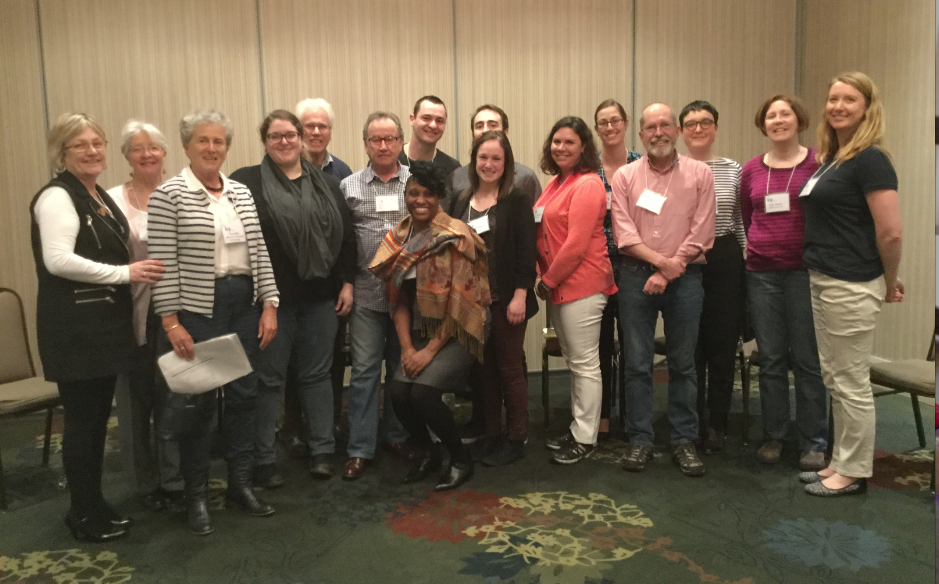 More than 70 practitioners from across Canada and the U.S. convened April 4-5, 2017, in Ottawa to converse about the future of restorative justice in that country. Hosted by IIRP Canada, the event used a restorative format to allow participants to interact and develop a list of themes that will guide progress of the movement.
More than 70 practitioners from across Canada and the U.S. convened April 4-5, 2017, in Ottawa to converse about the future of restorative justice in that country. Hosted by IIRP Canada, the event used a restorative format to allow participants to interact and develop a list of themes that will guide progress of the movement.
IIRP Canada Director Bruce Schenk says the forum was all he hoped it would be. “It gave people a chance to listen to each other and engage in dialogue about their experience of restorative justice.” At the same time, participants explored “what a new more relationally based justice paradigm might be and what it will take to get there.”
Schenk emphasizes the restorative nature of the structure of the two days. Each session involved a half hour presentation on some aspect of restorative practices, from an initiative to help women in prison build networks of support when they are released, to a community approach to youth justice. The presentations were followed by circle discussions where all participants had an opportunity to ask questions, share their own experience and help shape the ideas that would further the group’s thinking.
“What was quite striking was the representation of FNMI (First Nations, Mètis and Indigenous) voices in the proceedings," reports IIRP graduate and licensed trainer Rick Kelly, owner and founder of Just Us: A Centre for Restorative Practices, who took an active part in the Forum. "There were representatives from the Mètis of Alberta, Akwesasne Reserve, the Brant reserve and the Yukon. I believe that this advance and synergy has many implications. This includes the relevance to curriculum, as post-secondary institutions move to ‘indigenize’ curriculum as per the Truth and Reconciliation Commission recommendations."
Other participants included two superior court judges from Ontario working on land claims, the Commissioner on Human Rights from Alberta and a number of Federal Corrections representatives, Kelly recounts. “And there were four representatives from Campus Living at Algonquin College, the company that oversees student residence throughout Canada."
Participants who responded to a survey described the Forum as “awesome, amazing, inspirational, engaging and well-designed.” Survey respondents particularly appreciated learning about the use of circles outside of criminal justice and schools, especially in support of mental health issues, as a parenting technique, in churches and in college dormitories. The participants said they have taken action since the event: to discuss ways to ensure that inmates are exposed to restorative justice no matter where they are transferred; to develop ways to bring restorative practices to college dormitories; and to network with other organizations to foster training and sharing of information.
 IIRP Canada Director Bruce Schenk, standing, during panel presentationSchenk hopes that the discussions in Ottawa can help gather steam for more national conversations and action. Many of the people involved in the more intimate conversations at the forum will go on to participate in Canada’s annual Restorative Justice Symposium in November 2017 and the IIRP Canada Conference scheduled for spring 2018 in Toronto.
IIRP Canada Director Bruce Schenk, standing, during panel presentationSchenk hopes that the discussions in Ottawa can help gather steam for more national conversations and action. Many of the people involved in the more intimate conversations at the forum will go on to participate in Canada’s annual Restorative Justice Symposium in November 2017 and the IIRP Canada Conference scheduled for spring 2018 in Toronto.
“We’re at a threshold potentially with our systems,” Schenk maintains. “Our ability to make a strong move in a much more restorative direction rests on a couple factors. Right now, there’s an openness in government and a lot of public interest across the country, which is partly a result of the Truth and Reconciliation Commission. For Canada, which has provided a lot of leadership in restorative justice, these drivers could help take it to the next level. But it’s just a potential now. People have to work for this.”
